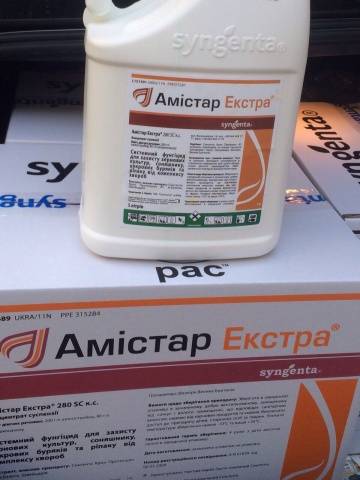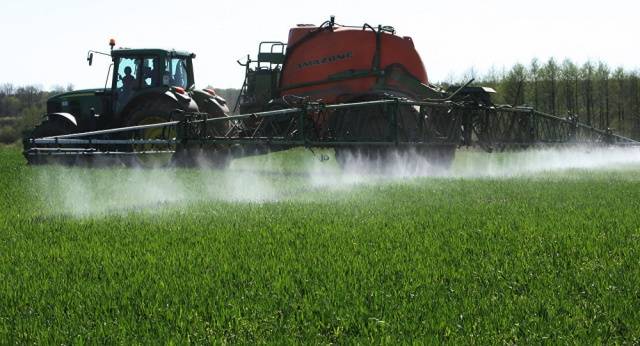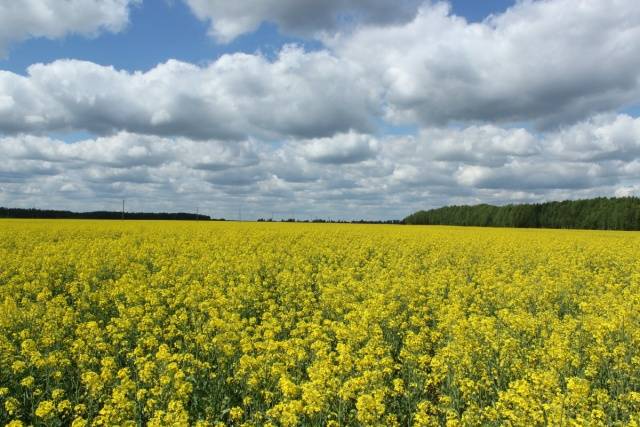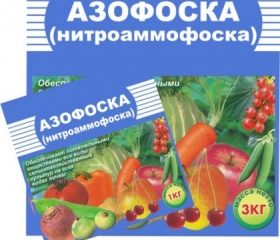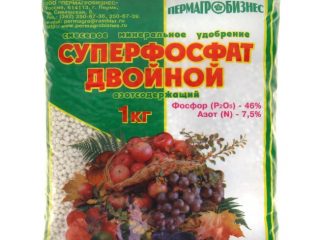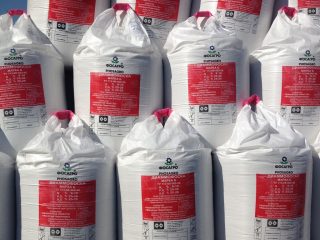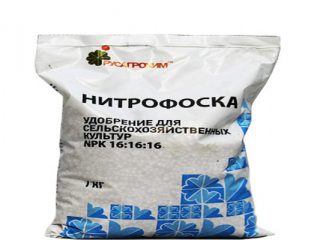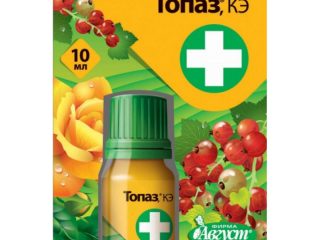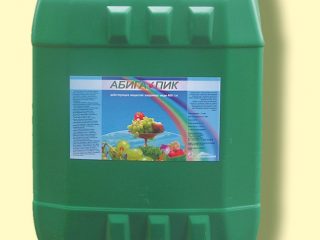Content
Fungal diseases can completely destroy crops. If the first signs of damage are present, the plants are treated with Amistar Extra. Its action is aimed at destroying harmful microorganisms. After treatment, long-term protection is provided to the plantings.
Features of the fungicide
Amistar Extra is a contact fungicide with good protective properties. The drug contains two active ingredients: azoxystrobin and cyproconazole.
Azoxystrobin belongs to the strobilurin class and provides a long-lasting protective effect. The substance blocks the respiratory function of fungal cells and effectively fights various diseases. Its content in the preparation is 200 g/l.
Cyproconazole has medicinal and protective properties. Within 30 minutes after spraying, the substance penetrates plant tissues and moves along them. Due to its high speed, the solution is not washed off with water, which reduces the number of treatments. The concentration of the substance in the preparation is 80 g/l.
Amistar Extra fungicide is used to protect grain crops from diseases of the ear and leaves. After treatment, plants become resistant to unfavorable conditions: drought, ultraviolet radiation, etc.In gardening, the product is used to protect flower gardens from fungal diseases.
Amistar affects the physiological processes occurring in plant tissues. The active ingredients activate antioxidant protection, help absorb nitrogen and optimize water metabolism. As a result, the immunity of the cultivated crops increases.
The drug in the form of a liquid suspension is supplied to the market by the Swiss company Syngenta. The substance is diluted with water to obtain a solution. The concentrate is packaged in plastic canisters of various capacities.
One of the varieties of the drug is the fungicide Amistar Trio. In addition to the two main components, it contains propiconazole. This substance is effective against pathogens of rust, spotting and powdery mildew, and has a powerful healing effect. Maximum effectiveness is observed in warm weather.
Amistar Trio fungicide is used to treat rice, wheat and barley. Spraying improves the quality of the crop. The application rates are the same as for the drug Amistar Extra.
Advantages
The main advantages of Amistar fungicide:
- comprehensive protection against diseases;
- fight against lesions at various stages;
- increase in crop yields;
- increasing plant immunity;
- helps crops absorb nitrogen;
- retains its effect after watering and precipitation;
- Suitable for tank mixtures.
Flaws
The disadvantages of the drug Amistar include:
- the need to adhere to safety rules;
- strict adherence to dosages;
- danger to bees;
- high price;
- only pays off when used over large areas.
Application procedure
Amistar Extra suspension is mixed with water to obtain a solution of the required concentration. First, the drug is diluted in a small amount of water, and the remaining water is gradually added.
To prepare the solution, use enamel, glass or plastic containers. The components are mixed manually or using mechanized equipment. Spraying requires a sprayer with a nozzle or special automated means.
Wheat
Amistar Extra fungicide protects wheat from a wide range of diseases:
- pyrenophorosis;
- rust;
- powdery mildew;
- septoria;
- ear rabble;
- Fusarium
Spraying is carried out during the growing season when signs of damage occur. The next treatment is performed after 3 weeks.
To treat 1 hectare of plantings, 0.5 to 1 liter of Amistar fungicide is required. The instructions for use require using 300 liters of solution for the specified area.
Fusarium head blight is a dangerous disease of wheat. Defeat leads to loss of yield. To combat the disease, plantings are sprayed at the beginning of flowering.
Barley
Amistar Extra protects barley from the following diseases:
- dark brown and reticulated spotting;
- powdery mildew;
- rhynchosporiasis;
- dwarf rust.
Spraying begins when symptoms of disease are present. If necessary, the procedure is repeated after 3 weeks. The consumption of the suspension per 1 hectare of barley planting is from 0.5 to 1 liter. To spray a given area, 300 liters of solution is required.
Rye
Winter rye is susceptible to stem and brown rust, olive mold, and rhynchosporium. Plantings are sprayed if there are signs of disease. Repeated treatment is carried out after 20 days if the disease has not receded.
The consumption of Amistar is 0.8-1 l/ha. To treat each hectare of fields, 200 to 400 liters of ready-made solution are required.
Rape
Rapeseed can be seriously affected by Phoma, Alternaria and Sclerotiosis. Plantings are protected from diseases by spraying during the growing season.
When disease symptoms appear, prepare a solution of Amistar Extra fungicide. According to the instructions for use, 10 ml of the drug is enough to treat 1 hundred square meters. The solution consumption for the specified area is from 2 to 4 liters.
Sunflower
Sunflower plantings are susceptible to fungal diseases: septoria, phomosis, downy mildew. During the growing season of plants, one treatment is carried out.
Spraying is necessary when the first signs of damage are detected. For 1 hundred square meters, 8-10 ml of Amistar is required. Then the average consumption of the finished solution will be 3 liters.
Corn
Corn processing is necessary if there are symptoms of helminthosporium, stem or root rot. Spraying is carried out at any stage of the growing season, but no later than 3 weeks before harvesting.
For each hectare of corn planting, 0.5 to 1 liter of fungicide is required. Then the consumption of the prepared solution will be 200-300 liters. 2 sprays per season are enough.
Sugar beet
Sugar beet plantings suffer from phomosis, cercospora blight, and powdery mildew. The diseases are fungal in nature, so fungicides are used to combat them.
For 1 hectare of plantings, 5-10 ml of Amistar is required. To treat this area, 2-3 liters of the resulting solution are required. During the growing season, the fungicide is used no more than 2 times.
Security measures
The drug Amistar Extra is assigned a hazard class 2 for humans and a hazard class 3 for bees.Therefore, when interacting with the solution, precautions must be taken.
The work is carried out on a cloudy day without rain or strong wind. It is possible to postpone processing to morning or evening.
If the solution gets on your skin, wash the area of contact with soap and water. In case of contact with eyes, rinse them with clean water for 10-15 minutes.
Fungicide Amistar is kept in a dry place, inaccessible to animals and children. Storage duration is no more than 3 years.
Reviews from gardeners
Conclusion
Amistar Extra acts on pathogens of fungal diseases and helps preserve the harvest. After treatment, the active substances penetrate the plants, destroy the fungus and provide long-term protection against new lesions.When working with fungicide, take precautions. The consumption of the drug depends on the type of crop being treated.
